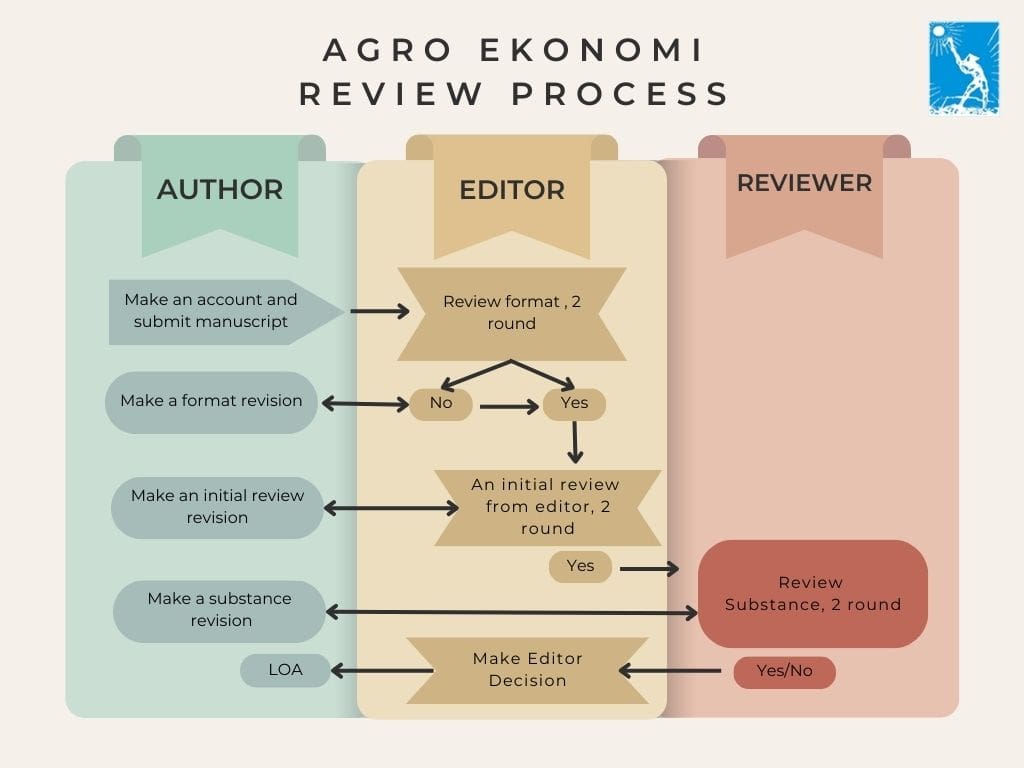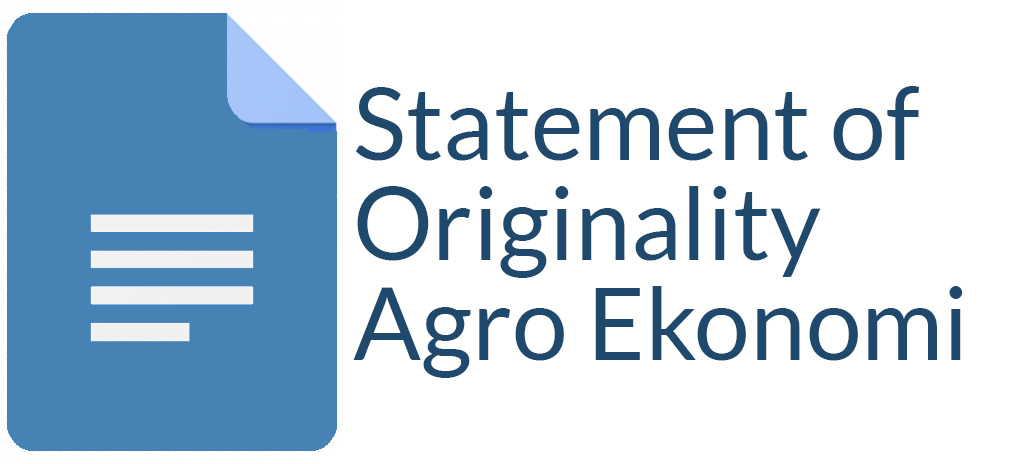Impact of Roundtable on Sustainable Palm Oil (RSPO) Certification on The Indonesian CPO Exports to The Destination Countries
Fachry Husein Rosyadi(1*), Dwidjono Hadi Darwanto(2), Jangkung Handoyo Mulyo(3)
(1) Department of Agricultural Socio-Economics, Faculty of Agriculture, Universitas Gadjah Mada
(2) Department of Agricultural Socio-Economics, Faculty of Agriculture, Universitas Gadjah Mada
(3) Department of Agricultural Socio-Economics, Faculty of Agriculture, Universitas Gadjah Mada
(*) Corresponding Author
Abstract
Palm oil is one of the plantation commodities that has an important role in economic contribution in Indonesia because of its ability to produce vegetable oil which is essential for industrial sector. The potential development of Indonesia's palm oil exports is high considering the benefits derived from these products. Therefore, there is a need to ensure that CPO products have a sustainable nature, one of which is that CPO products must be RSPO certified. This study analyzes how the influence of various factors that can affect Indonesia's CPO exports, one of which is RSPO certification using panel regression with the basic gravity model. The data which is used in this research is panel data in the form of time series for 20 years with cross sections from five major importing during 1999-2018. The analysis shows that the exchange rate and the RSPO significantly and positively affect Indonesia's CPO exports, while the population of the importing country has a significant and negative effect. This confirms that the presence of RSPO certified products will increase Indonesian CPO exports to major importing countries. Although the RSPO has an effect on Indonesia's CPO exports, there are still a number of indicators from it, in which, Indonesia has not been able to fulfill. That indicator can be used as a material for consideration to be adopted in national certifications such as ISPO so that Indonesian CPO products can be perceived to be sustainable so that they can reach wider export markets.
Keywords
Full Text:
PDFReferences
Arita, S., Beckman, J., & Mitchell, L. (2017). Reducing transatlantic barriers on U . S . -EU agri-food trade : What are the possible gains ? Food Policy, 68, 233–247. https://doi.org/10.1016/j.foodpol.2016.12.006
Arumta, N., Mulyo, J. H., & Irham, I. (2019). The Export Determinants of Indonesian Cut Flower in The International Market. Agro Ekonomi, 30(1). https://doi.org/10.22146/ae.44856
Bantolo. (2019). Indonesia dan India Perkuat Kerjasama Sawit Berkelanjutan. Retrieved April 19, 2020, from https://www.agrofarm.co.id/2019/03/13041/
Bergstrand, J. H. (1989). The generalized gravity equation, monopolistic competition, and the factor-proportions theory in international trade. The Review of Economics and Statistics, 71(1), 143–153. https://doi.org/10.2307/1928061
Brandi, C., Cabani, T., Hosang, C., Schirmbeck, S., Westermann, L., & Wiese, H. (2015). Sustainability Standards for Palm Oil: Challenges for Smallholder Certification Under the RSPO. Journal of Environment and Development, 24(3), 292–314. https://doi.org/10.1177/1070496515593775
Erman, E. (2017). Di Balik Keberlanjutan Sawit : Aktor , Aliansi Dalam Ekonomi Politik Sertifikasi Uni Eropa *. Masyarakat Indonesia, 43(1), 1–13. https://doi.org/https://doi.org/10.14203/jmi.v43i1.751
Gabungan Pengusaha Kelapa Sawit Indonesia (GAPKI). (2017). Tameng Produksi Dagang dan Resolusi Sawit Eropa. Retrieved February 15, 2020, from https://gapki.id/news/2404/tameng-proteksi-dagang-resolusi-sawit-eropa
Gassler, B., & Spiller, A. (2018). Is it all in the MIX ? Consumer preferences for segregated and mass balance certi fi ed sustainable palm oil. Journal of Cleaner Production, 195(1169), 21–31. https://doi.org/10.1016/j.jclepro.2018.05.039
Hasanov, A. S., Baharumshah, A. Z., & Shitan, M. (2011). Exchange Rate Risk and Trade Flows: A Gravity Equation Approach. (March).
Hidayat, N. K., Glasbergen, P., & Offermans, A. (2015). Sustainability certification and palm oil smallholders’ livelihood: A Comparison between Scheme Smallholders and Independent Smallholders in Indonesia. International Food and Agribusiness Management Review, 18(3), 25–48. https://doi.org/10.22004/ag.econ.208400
Iqbal, M. (2015). Regresi Data Panel (2): Tahap Analisis. Retrieved from https://dosen.perbanas.id/regresi-data-panel-2-tahap-analisis/
Ivander, J. (2019). Implementasi Percepatan ISPO Capai 502 Sertifikat 4.115 Juta Ha. Retrieved April 19, 2020, from https://www.astra-agro.co.id/2019/03/29/implementasi-percepatan-ispo-capai-502-sertifikat-4115-juta-ha/
Kabir, M., Salim, R., & Al-Mawali, N. (2017). The gravity model and trade flows: Recent developments in econometric modeling and empirical evidence. Economic Analysis and Policy, 56, 60–71. https://doi.org/10.1016/j.eap.2017.08.005
Khatun, R., Reza, M. I. H., Moniruzzaman, M., & Yaakob, Z. (2017). Sustainable oil palm industry: The possibilities. Renewable and Sustainable Energy Reviews, 76(December 2016), 608–619. https://doi.org/10.1016/j.rser.2017.03.077
Khor, Y. (2013, April). Struggle for sustainability in palm oil industry shows results: ISEAS perspective. 1–8.
Mahat, S. B. A. (2012). The Palm Oil Industry From The Perspective of Sustainable Development: A Case Study of Malaysian Palm Oil Industry (Ritsumeikan Asia Pacific University Japan). Retrieved from http://r-cube.ritsumei.ac.jp/bitstream/10367/4738/1/51210600.pdf
Mansor, N., Wan Abdullah, W. A., Asniati, B., & Hassan Syukri, A. F. (2016). Palm Oil Sustainability Certification and Firm Performance: Is There a Conflict Between RSPO and MSPO? Retrieved from www.iafor.org
Martin, S., Rieple, A., Chang, J., Boniface, B., & Ahmed, A. (2015). Small farmers and sustainability: Institutional barriers to investment and innovation in the Malaysian palm oil industry in Sabah. Journal of Rural Studies, 40, 46–58. https://doi.org/10.1016/j.jrurstud.2015.06.002
Ministry of Trade Republic of Indonesia. (2019). Indonesia Manfaatkan RCEP Untuk Muluskan Ekspor CPO ke India. Retrieved April 19, 2020, from https://www.kemendag.go.id/id/newsroom/media-corner/indonesia-manfaatkan-rcep-untuk-muluskan-ekspor-cpo-ke-india-1
Moreno-Peñaranda, R., Gasparatos, A., Stromberg, P., Suwa, A., Pandyaswargo, A. H., & Puppim de Oliveira, J. A. (2015). Sustainable production and consumption of palm oil in Indonesia: What can stakeholder perceptions offer to the debate? Sustainable Production and Consumption, 4(May), 16–35. https://doi.org/10.1016/j.spc.2015.10.002
Mukherjee, I., & Sovacool, B. K. (2014). Palm oil-based biofuels and sustainability in southeast Asia: A review of Indonesia, Malaysia, and Thailand. Renewable and Sustainable Energy Reviews, 37, 1–12. https://doi.org/10.1016/j.rser.2014.05.001
Nesadurai, H. E. S. (2013). Food security, the palm oil-land conflict nexus, and sustainability: A governance role for a private multi-stakeholder regime like the RSPO? Pacific Review, 26(5), 505–529. https://doi.org/10.1080/09512748.2013.842311
PASPI. (2018). ANALISIS EKSPOR CPO INDONESIA KE UNI EROPA : Faktor Apa yang Mendorong Trend Positif? Retrieved April 20, 2020, from https://gapki.id/news/4268/analisis-ekspor-cpo-indonesia-ke-uni-eropa-faktor-apa-yang-mendorong-trend-positif
Ridwannulloh, & Sunaryati. (2018). Determinants of Indonesian Crude Palm Oil Export: Gravity Model Approach. Jurnal Ekonomi & Studi Pembangunan, 19(2), 134–141. https://doi.org/10.18196/jesp.19.2.5004
RSPO. (2018). Prinsip dan Kriteria untuk produksi minyak kelapa sawit lestari 2018.
Ruysschaert, D., & Salles, D. (2014). Towards global voluntary standards: Questioning the effectiveness in attaining conservation goals. The case of the Roundtable on Sustainable Palm Oil (RSPO). Ecological Economics, 107, 438–446. https://doi.org/10.1016/j.ecolecon.2014.09.016
Salman, F., Najib, M., & Djohar, S. (2017). Cost and Benefit Analysis of RSPO Certification (Case Study in PT BCA Oil Palm Plantation in Papua). Indonesian Journal of Business and Entrepreneurship, 3(3), 219–228. https://doi.org/10.17358/ijbe.3.3.219
Saptia, Y., & Ermawati, T. (2013). Kinerja Ekspor Minyak Kelapa Sawit Indonesia. Jakarta.
Sari, A. R., Hakim, D. B., & Anggraeni, L. (2014). Analisis Pengaruh Non-Tariff Measures Ekspor Komoditi Crude Palm Oil (Cpo) Indonesia Ke Negara Tujuan Ekspor Utama. Jurnal Ekonomi Dan Kebijakan Pembangunan, 3(2), 111–135. https://doi.org/10.29244/jekp.3.2.111-135
Sarwoko. (2009). Perdagangan Bilateral antara Indonesia dengan Negara-Negara Patner Dagang Utama. Jurnal Ilmiah MTG, 2(1).
Seidel, F. R. (2017). RSPO adoption process in the Colombian palm oil growers : What are the obstacles and how to overcome them ?
Shepotylo, O. (2016). Effect of non-tariff measures on extensive and intensive margins of exports in seafood trade. Marine Policy, 68, 47–54. https://doi.org/10.1016/j.marpol.2016.02.014
Suharto, R., Husein, K., Sartono, Kusumadewi, D., Riksanto, D., Hariyadi, … Prasodjo, R. (2015). Studi Bersama Persamaan dan Perbedaan Sistem Sertifikasi ISPO dan RSPO. Retrieved from www.rspo.org, www.id.undp.org
Tey, Y. S., Brindal, M., Darham, S., Sidique, S. F. A., & Djama, M. (2020). Early mover advantage in Roundtable on Sustainable Palm Oil certification: A panel evidence of plantation companies. Journal of Cleaner Production, 252. https://doi.org/10.1016/j.jclepro.2019.119775
Tinbergen, J. (1962). Shaping the World Economy: Suggestions for an International Economic Policy. New York: Twentienth Century FUnd.
TradeMap. (2020). Trade statistics for international business development monthly, quarterly, and yearly trade data. Retrieved from https://www.trademap.org
UNComtrade. (2020). Commodity statistitic. Retrieved from https://comtrade.un.org/data/
Wei, S.-J., & Frankel, J. A. (1995). Open regionalism in a world of continental trade blocks (No. 5272). Cambridge.
Widarjono, A. (2013). Ekonometrika Pengantar dan Aplikasinya. Yogyakarta: UTP STIM YKPN.
Yang, S., & Martinez-Zarzoso, I. (2014). A panel data analysis of trade creation and trade diversion effects: The case of ASEAN-China Free Trade Area. China Economic Review, 29, 138–151. https://doi.org/10.1016/j.chieco.2014.04.002
Yonanda, A. D., & Suhadak. (2017). Pengaruh Black Campaign Kelapa Sawit Terhadap Harga Kelapa Sawit Dunia dan Ekspor Kelapa Sawit Indonesia ( Studi Pada Negara Belanda, Spanyol, Cina Dan India Periode Agustus 2016 – Oktober 2017 ). Fia Ub, 72(2), 234–242.
Yulhar, T. F. M., & Darwanto, D. H. (2019). Competitiveness Of Indonesian Crude Coconut Oil Export In Destination Countries. Agro Ekonomi, 30(2). https://doi.org/http://doi.org/10.22146/ae.49014
Article Metrics
Refbacks
- There are currently no refbacks.
Copyright (c) 2018 Agro Ekonomi

This work is licensed under a Creative Commons Attribution-ShareAlike 4.0 International License.
View My Stats











